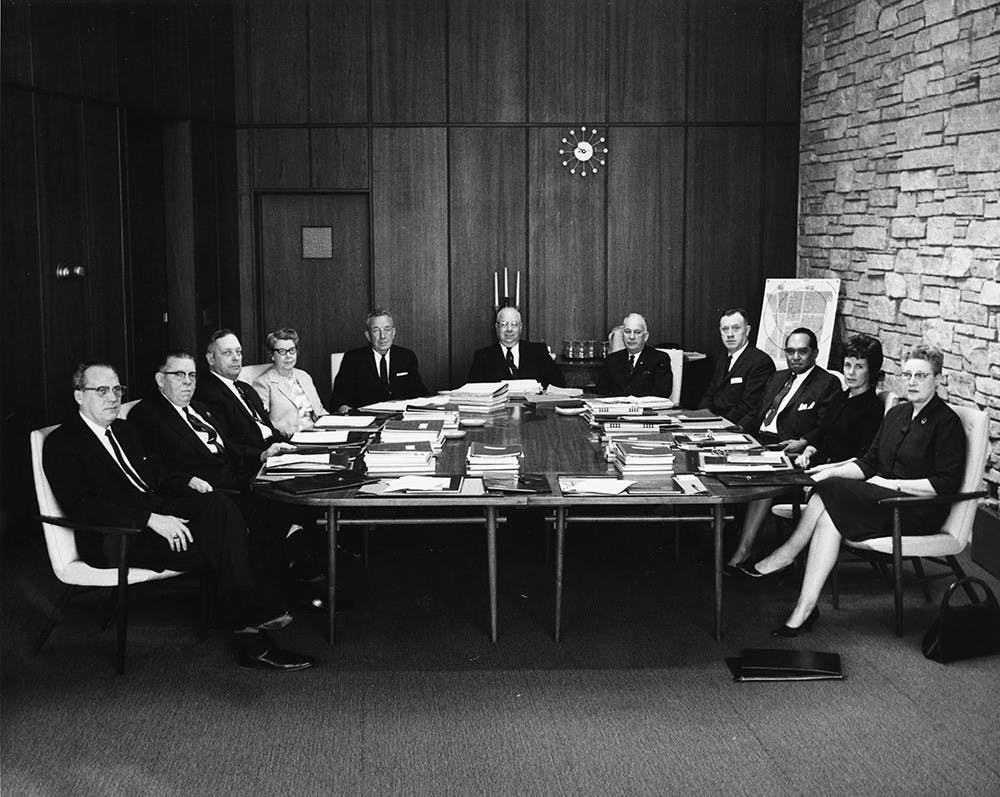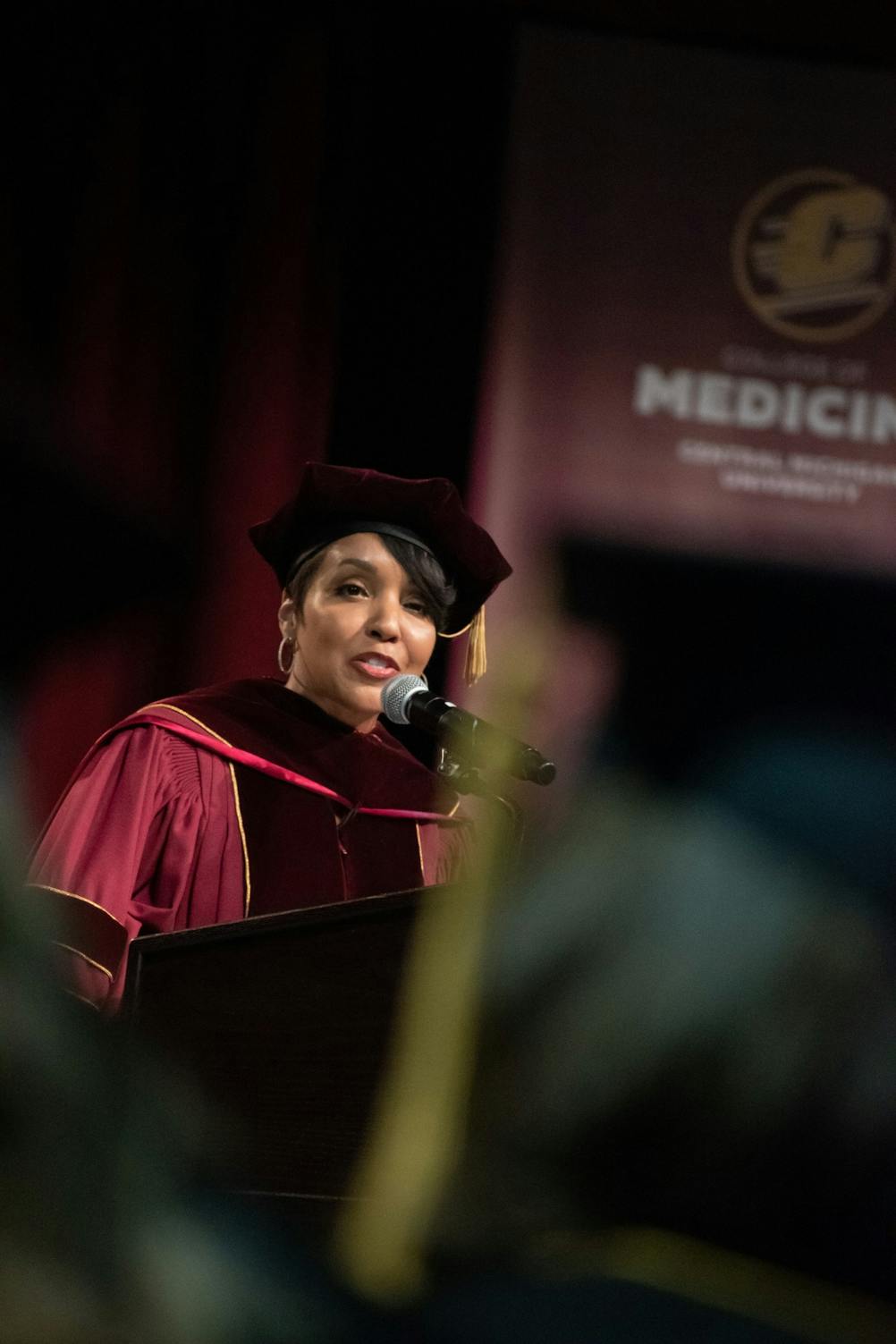Then and Now: Diverse voices of women on the Board of Trustees

Courtesy of the Clarke Historical Library, and first published in Feb. 1964 Centralight.
The original members of the Central Michigan Board of Trustees included (from left): Norvall Bovee (Treasurer) Willis Campbell, Walter Wightman, Katharine Hafstad, Lawrence Rahilly, Judson Foust (Former CMU President), E. Allan Morrow, (Chairman), John Sivier, Lloyd Cofer, Jean Backus, and Mrs. Doris Crippo (Secretary).
People in positions of power will come and go with the passage of time.
One area of power on Central Michigan University’s campus that has stood the test of time is the Board of Trustees, the group that works to make decisions for the university. With over 62 people rotating through its 60 years of existence, they made various policy changes that have affected the university on small and large scales.
Women have been serving on the board since it was first created, and women continue to serve on the board today making various decisions that advance university policies.
The first CMU Board of Trustees meeting was held on Feb. 24, 1964. The members were appointed by then governor George Romney. The board had eight members, all of which were introduced in the 1964 February edition of Centralight.
Two of these first board members were women.
The first women
Katharine Hafstad was a trustee that made her way through the ranks and became chairwoman. The Centralight article said she was a business owner, school teacher and Air Force veteran.
Hafstad served on the board for almost 20 years, retiring in 1983. She made several strides for the university, such as implementing anti-discrimination housing policies (allowing interracial housing off-campus and further investigation of discrimination cases on campus) and abolishing “in loco parentis” (the idea that the university could act as a student’s parent when it came to discipline). She would also hire two university presidents during her tenure: William Boyd and Harold Abel.
She died in 1996 in her home in Harbor Springs, Michigan.
The other woman at that time on the board was Jean Backus. She was known for her work in the League of Women Voters, Boy Scouts and Girl Scouts of America as well as various charity organizations according to her obituary.
Backus served two terms at the university lasting only eight years. During her second term, she served as vice chair for the board alongside Hafstad, passing the same policies and making the same strides the chairwoman did.
When Backus’ time on the board ended in October 1970, she and her husband moved to Sebring, Florida. She lived in the state until 2011, where she died in her home.
Both women were passionate about education and making a difference in the world, whether it be through CMU or their other commitments.

Experience in diversity and inclusion
Sixty years later, a new woman holds the position of vice chair for the CMU board of trustees. Her name is Denise Mallett. She said that being a woman on the board, it’s important to make her voice heard to keep and share an open dialogue.
“It’s important to me to uncover issues that may have been overlooked … and to continue to pave a way for others to be in that seat,” she said.
Mallett was appointed and accepted her position in the board just over a year ago, completing the first of an eight-year journey.
“My years of experience has led me down this pathway and to this position,” Mallett said. “It was my opportunity to give back, to serve and to bring my years of experience and knowledge to a group and institution. I take a lot of pride in it.”
She has worked as an admissions counselor at Marygrove College and a professor at Wayne State University, which helps her stay connected to higher education, he said.
Mallett was also the director of diversity and inclusion at the University of Detroit Jesuit High School and Academy. Here at CMU, she said there's an understanding that diversity and inclusion is important.
“In my one year, I have seen nothing but glowing approaches to the seriousness of (diversity and inclusion),” she said. “The systems are in place, which is huge."
While Mallett said the board doesn’t play any role in the diversity on campus, it's something the board gets updated on in terms of movements, policies and management.
“I absolutely believe in diversity in all fashions, or more importantly, diversity of thought,” she said. "It's making sure that we are supportive to all students from all walks of life, and I’m definitely seeing that in student affairs and in some of the programming that they are doing, as well as academically.
"Diverse voices should be there as well … making sure that other people hear other voices.”
Mallett said she is pleased there is still representation of women on the Board of Trustees. Of the eight seats, three are women of color. She thinks that’s a powerful move by Governor Gretchen Whitmer, who appointed them to the board in March 2021 and February 2023 respectively.
“Even though we’re three women of color, we bring different perspectives,” she said.
The second she was announced to be on the board, Mallett said she felt welcomed by the other two women on the board, Sharon Heath and Regine Beauboeuf.
“To have that connection almost immediately has made it not only a joy to be on the board, but to build what I feel are turning into friendships,” Mallett said.
Women positions at CMU
While Mallet said she was pleased with their being representation on the board of trustees, it has not always been that way.
Marian Matyn is an archivist at the Clarke Historical Library at CMU, and she is responsible for maintaining and categorizing primary source documents on CMU and Michigan history. She said when the university opened in 1892, opportunities for women was extremely limited.
"There were no women working there in the first few years," she said. "Those that did were mostly based in education, children's education... and music education.
"There weren't any woman in upper management until (William) Boyd's presidency in the 1960s. He made it so there were more women roles, more minority roles... he had more forward thinking ideas than previous presidents, so many things changed at that time."
Matyn has been working at the university since 1996. Throughout her time working in the library, she said she has seen positions of power and opportunities for woman increase. She cites former interim President Katheleen Wilbur as an example of this.
"Wilbur was groundshaking," she said. "After her term, new positions arose for women. We have a vice president for DEI and a head for Innovation and Online... In the library, my immediate supervisor is a woman. The dean of the libraries is a woman. That was not the situation when I got here."
Matyn said that despite the progress that has been made at CMU when it comes to women in power, the university still has a ways to go.
"It's clear there's a path if they want it," she said. "They have a seat at the table and a voice... But it's still difficult for women. Not every path is as open as you'd like it to be, but you can still accomplish a lot if you know the right people."
The board's ripple effect
Meanwhile, Mallett’s work on the Board of Trustees has affected the students at the university, and some students speak positively about their progress.
Tyler Zimmerman is the current president for the Student Government Association at CMU. While he has been a member of SGA for three years, he has only served as president for one.
Throughout his time at Central, Zimmerman has attended roughly four Board of Trustee meetings. Additionally, he has served on several committees as a student representative and worked alongside Mallett briefly on liasion committees. He will be working with her in the near future to select the next president for CMU.
“She’s been a great champion for students on this campus,” he said. “She cares deeply about students at CMU and is doing all in her power to support students.”
Zimmerman is set to graduate in December of 2024 and will not be running for SGA president again. He believes his administration has made a great impact at CMU when it comes to shaping its future.
“It’s been a great privilege and honor to serve this role,” he said. “We’ve been fighting to make student voices heard, and I think we’ve been very successful.”
Zimmerman’s sentiment of serving the students and shaping history is one that Mallett shares.
“It’s significant for me at this moment in time, in history, to be on the board that is representing a state and nationally,” she said. “It’s quite meaningful to me and I don’t take it for granted.”



